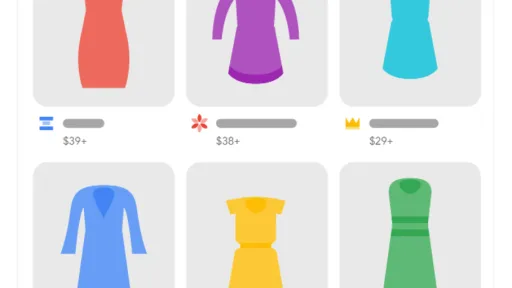We all know there have been many changes in search results over the past year, including AI Overviews (not yet rolled out in Europe), Reddit becoming more visible, Google's site reputation abuse policy (better known among SEOs as ''parasite SEO''), and the list goes on. However, one important topic is often overlooked: Google's major updates for e-commerce search results. Google's e-commerce search results now resemble Amazon-style category pages. E-commerce websites need to adapt by prioritizing product pages for SEO.
The new e-commerce search experience
What does this mean for e-commerce websites after all these changes? Let's look at some search results, using ''espresso machines'' as an example. When looking at organic results, users immediately see a list of products before seeing other organic results. This search result is also known as 'Merchant Listings' or 'Popular Products'.
That's only half the picture. As mentioned, the 'Refine results' section in the left sidebar (this bar is not yet displayed in Europe). This section essentially gives users filter options directly in the results themselves.
Assume users don't scroll past the initial results. If these products aren't what they want, they refine the search by selecting specific features. For example, if you choose an ''automatic'' machine ''with grinder'', Google is asked to perform a new search with those terms added to the original query.
What do we see when looking at these results? Again, here's another result where products appear before anything else in the organic result.
When clicking on any of these results, an expandable sidebar opens on the right with detailed product information, including:
- Multiple product images
- Prices
- Third-party retailers
- Product descriptions
- Dimensions
- And more.
All this before we've even clicked on a website link. Now let's look at the first category page in the search results for the query ''espresso machines''. Notice how similar it looks to what we just saw.
Does this mean the death of the category page?
What do all these changes mean? It appears Google is trying to copy the experience of a traditional category page directly to the search results. By displaying products, filters, reviews, prices, and more, Google creates an Amazon-like experience without needing to visit a third-party site. While category pages are still important, Google's focus is clearly shifting toward product pages rather than traditional category pages.
Why is Google doing this?
In 2021, Faisal Masud wrote a thought-provoking article, ''The Last E-Commerce Duel Between Amazon and Google'', a must-read for anyone in e-commerce. He emphasized:
- The long-standing competition between Google and Amazon for e-commerce market share.
- Google's missteps and decline in product search engine market share from 54% to 46% in 2018.
- That 74% of product searches now start on Amazon.
Many of us probably still skip Google entirely when shopping online, which is a huge missed opportunity for Google. This makes Amazon perhaps its biggest competitor – even more than other search engines.
A renewed focus on product pages
In e-commerce SEO, category pages have long been the cornerstone of this strategy, assigned to high-value searches and receiving the most attention. However, with Google's 'Merchant Listings' or 'Popular Products' taking over, category pages are losing visibility. To align with Google's direction, we need to adapt our SEO strategies and give product pages, which now appear in search results, equal (or perhaps even more) priority. Previously, product pages were often overlooked. Now we need to optimize them by updating titles, descriptions, and product data and ensuring that key features users search for are clearly emphasized in the listings.
Want more information about optimizing product pages for Organic Shopping? Read our blog Google Organic Shopping: Tips for success in 2024.
The rise of product data and SEO
Like structured data, product data is a feed that allows search engines to quickly and efficiently understand important information about a particular product. Traditionally, SEOs have left this to their Ads colleagues. What many don't realize is that Google has its own e-commerce SEO guide, which emphasizes the importance of product data. Google dedicates an entire page to it and emphasizes its significance in multiple sections throughout the guide.
Brodie Clark, an SEO expert, has conducted extensive tests on the new product results, often highlighting the influence of Merchant Center on these results. It's clear that product feeds play a crucial role in these product results, making them something that can no longer be overlooked. It's now essential that these feeds are submitted to Google, are accurate, contain long-tail keywords, and are as complete as possible.
An opportunity to appear for high-volume searches
Historically, we've prioritized category pages, particularly those targeting high-volume searches. We'd rather rank for a broad search like ''jeans'' than for a more specific search like ''ripped jeans men''. However, now that Google acts as our new category page, we need to shift our focus to long-tail searches. This shift presents an important opportunity, particularly for smaller players. For example, searching for the highly competitive term ''jeans'' typically yields large brands like Zara and Zalando.
Unless you're one of these national retailers, most SEOs will tell you to ignore this search completely. It's far too competitive to be relevant. But what happens when I start filtering using the options on the side? Again, these filter options haven't been rolled out in Europe yet. Google is now my category page, so I want to see options that better suit me. I'm looking for ''size 36 flare jeans''. I've applied the filter options and Google has modified my search.
Looking ahead
From a business perspective, Google's direction becomes clear when we consider all the recent changes. Google will continue to refine search results to mirror a category page experience. Don't expect Google to reverse these changes. We should expect more of them. Google hasn't started showing filter options in Europe yet, but I think it will. The same goes for showing these in AI Overviews (in the US). To compete with Amazon, Google will continue to do whatever necessary to make its platform more user-friendly for e-commerce searches. E-commerce websites need to understand this behavior and adjust their strategies accordingly.
Want to know how to optimize your e-commerce webshop for SEO? Then contact us today!
```




